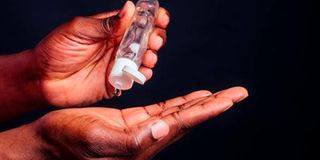Are you still observing Covid-19 guidelines?

The use of sanitisers became a common practice in the wake of the Covid-19 pandemic.
What you need to know:
- Washing hands regularly is one of the ways to keep you from getting sick.
- Handwashing stops the spread of germs, including the microscopic bacteria, viruses, fungi, and protozoa that can cause disease.
- It protects you from simple infections like the common cold and even serious infections such as meningitis, bronchiolitis, the flu, hepatitis A, and diarrhea.
Few Kenyans have kept their masks on since March 11, 2022, when the Ministry of Health lifted the mask mandate. Even prior to this, few preventive measures against Covid-19 were being observed. Besides the masks, the handwashing pumps and pitchers that were strategically placed in front of all businesses had disappeared. Few are still washing and sanitising their hands.
Washing hands regularly is one of the ways to keep you from getting sick. It stops the spread of germs, including the microscopic bacteria, viruses, fungi, and protozoa that can cause disease. “Good handwashing is the first line of defense against the spread of illnesses. It protects you from simple infections like the common cold and even serious infections such as meningitis, bronchiolitis, the flu, hepatitis A, and diarrhea,” Johns Hopkins Medicine states.
There is an effective and preventive way to wash your hands. Unfortunately, Johns Hopkins says many people do not know how to wash their hands correctly. Apparently, there’s more to hand washing than just picking up soap and turning the water tap on.
The best way to wash hands
- Wet your hands with clean, running water. This could either be warm or cold water.
- Use soap. Lather up for about 20 seconds. Any soap works as long as it has been certified by a regulating authority such as KEBS. Also, the soap does not necessarily have to be antibacterial.
- Ensure that when cleaning your hands, you wash between your fingers, on the backs of your hands, and under your nails where germs like to hide. Do not forget to wash your wrists.
- Rinse your hands and dry them well with a clean towel.
You may also use the handwashing method used by health practitioners. According to the World Health Organization, when using this method, you should follow the following steps:
- Wet your hands with water
- Apply enough soap to cover all hand surfaces
- Rub hands palm to palm
- Right palm over left dorsum with interfaced fingers and vice versa
- Palm to palm with fingers interlaced
- Backs of fingers to opposing palms with fingers interlocked
- Rotational rubbing of left thumb clasped in right palm and vice versa
- Rotational rubbing, backward and forwards with clasped fingers of the right hand in the left palm and vice versa
- Rinse hands with water
- Dry hands thoroughly with a single-use towel
- Use a towel to turn off the faucet
- Your hands are now safe
The WHO also recommends that besides hand washing, take care of your hands by:
- Regularly using a protective hand cream or lotion, at least daily.
- Not using hot water to rinse your hands.
- Not routinely washing hands with soap and water immediately before or after you have sanitized your hands with an alcohol-based hand rub.
When should you continue to wash your hands?
To keep the habit of washing hands and continue keeping a myriad of germs at bay, Johns Hopkins Medicine recommends washing hands after the following activities:
- Before eating and cooking
- After using the bathroom
- After cleaning around your house
- After touching pets and other animals
- Before and after visiting or taking care of a sick person
- After blowing your nose, coughing, or sneezing
- After going outside your home
You don’t always have to use soap and water. If you are traveling, for example, have waterless hand sanitizers or scrubs with you. “These could be liquids, wipes, sprays, or towelettes. You can buy travel sizes to keep in your bookbag, car, locker, purse, or sports bag,” John Hopkins Medicine recommends. It is important you buy these from authorised sellers such as a licensed pharmacy.





